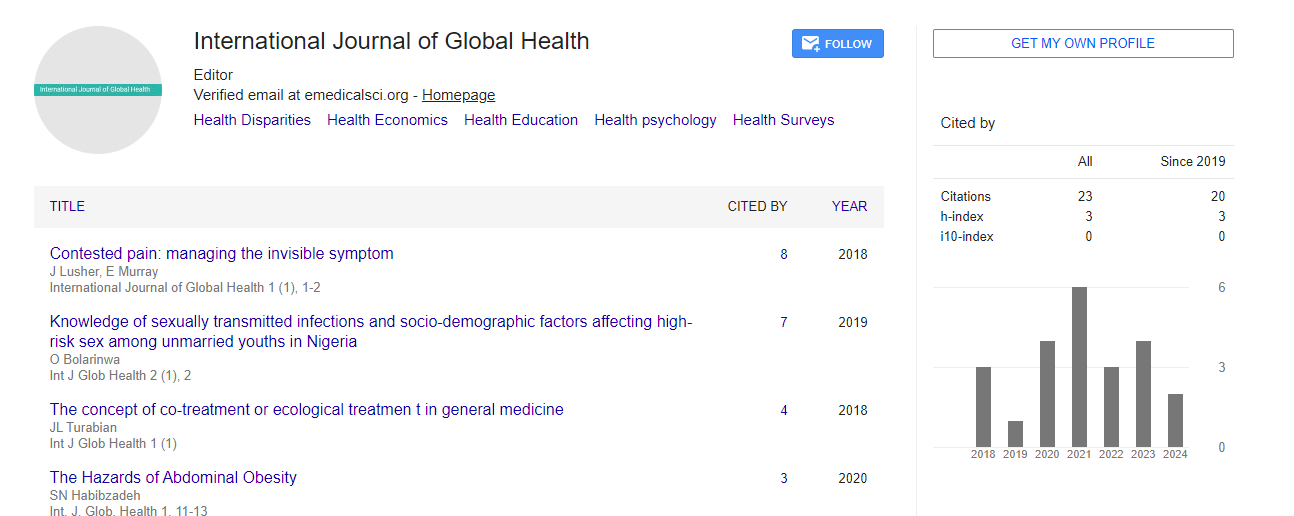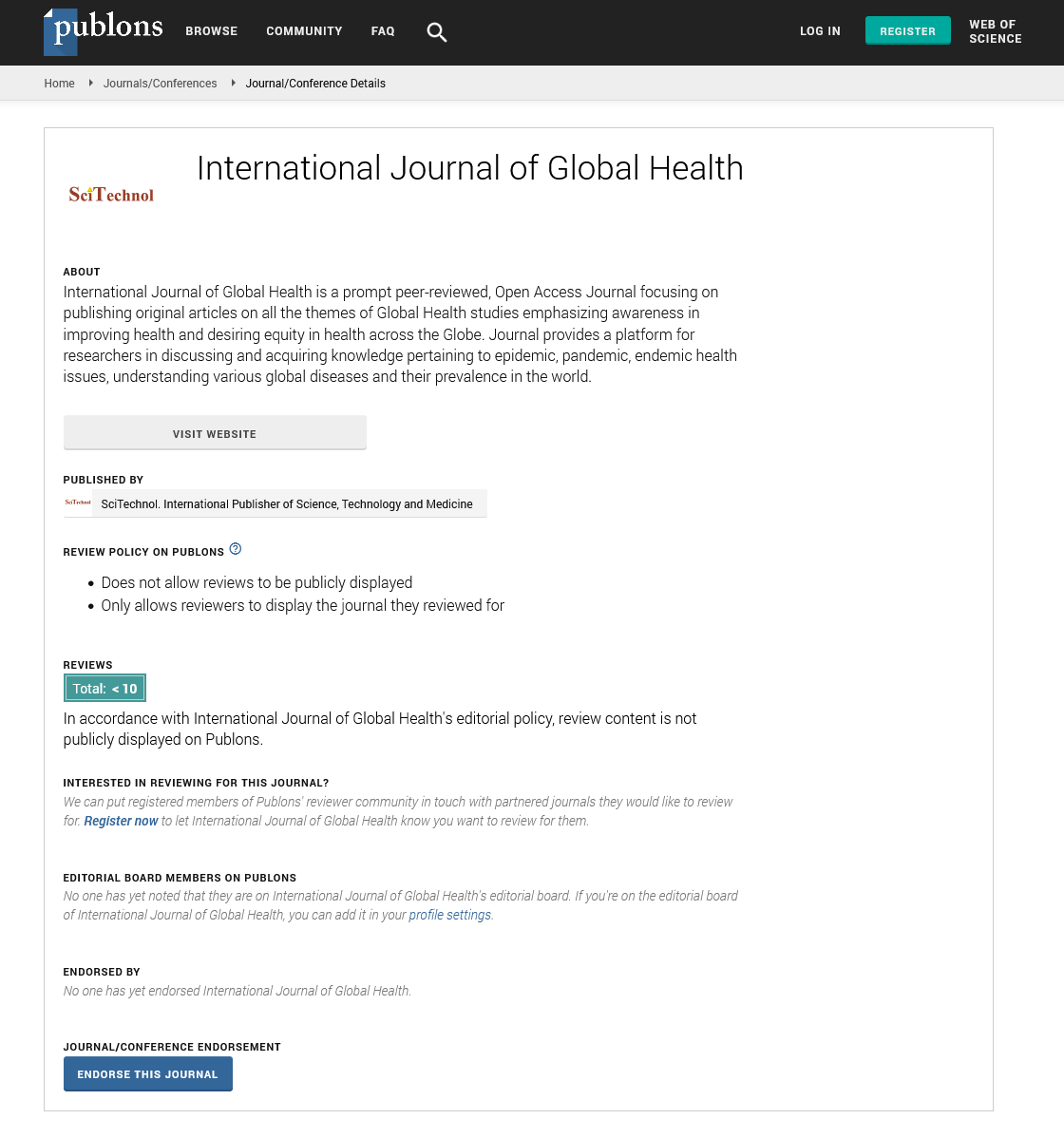Perspective, Int J Glob Health Vol: 6 Issue: 4
Innovations in Global Health Policy: From Theory to Implementation
Maria Groen*
1 Department of Global Health Informatics, MetaHealth University, Technocity, Singapore
*Corresponding Author: Maria Groen,
Maria Groen, Department of Global Health Informatics,
MetaHealth University, Technocity, Singapore
E-mail: groenmaria@mhu.du.sg
Received date: 27 November, 2023, Manuscript No. IJGH-24-125961;
Editor assigned date: 29 November, 2023, Pre QC No. IJGH-24-125961 (PQ);
Reviewed date: 14 December, 2023, QC No. IJGH-24-125961;
Revised date: 21 December, 2023, Manuscript No. IJGH-24-125961 (R);
Published date: 28 December, 2023, DOI: 10.4172/Ijgh.1000200
Citation: Groen M (2023) Innovations in Global Health Policy: From Theory to Implementation. Int J Glob Health 6:4.
Description
The dynamic field of global health policy is characterized by a continual quest for innovative approaches that transcend theoretical frameworks and translate into impactful implementation strategies. "Innovations in Global Health Policy: From Theory to Implementation," as explored in the International Journal of Global Health, delves into the evolving landscape of global health policy, emphasizing the imperative of turning theoretical advancements into practical solutions for improving health outcomes worldwide. Global health policy is shaped by theoretical foundations that guide the formulation of strategies to address complex health challenges on a global scale. Theories provide a framework for understanding the determinants of health, identifying intervention points, and predicting potential outcomes. From socio-ecological models to political economy perspectives, these theories inform the development of policies that aim to enhance health equity, access to healthcare, and overall wellbeing.
In recent years, innovative theoretical paradigms have emerged to address contemporary global health challenges. The social determinants of health framework, for example, emphasizes the impact of social, economic, and environmental factors on health outcomes. This paradigm recognizes that health is influenced by factors beyond the healthcare system, necessitating comprehensive policy approaches that address root causes of health disparities. Similarly, the One Health approach acknowledges the interconnectedness of human, animal, and environmental health. By recognizing the complex relationships between these domains, this theoretical framework promotes policies that transcend traditional silos, fostering collaborative strategies to address zoonotic diseases, antimicrobial resistance, and environmental health threats.
While theoretical advancements provide a conceptual foundation, the true impact of global health policy lies in effective implementation. The gap between theory and action is a persistent challenge, and innovations in this realm are essential for transforming theoretical constructs into tangible outcomes. Innovations in global health policy often involve experimentation and pilot programs to test the feasibility and effectiveness of theoretical frameworks in real-world settings. Pilots allow policymakers to assess the practical implications of policies, identify challenges, and refine strategies before full-scale implementation.
The advent of technology has facilitated data-driven decisionmaking in global health policy. Innovations such as health information systems, electronic health records, and real-time data analytics enable policymakers to monitor health indicators, track progress, and make informed decisions. Data-driven approaches enhance the precision and efficiency of policy implementation. Innovations in governance structures emphasize the importance of inclusivity and participation in policy development and implementation. Engaging communities, civil society organizations, and stakeholders in decision-making processes ensures that policies align with the diverse needs and perspectives of populations. Participatory approaches enhance the legitimacy and effectiveness of global health policies.
Collaborations between public and private sectors have become instrumental in implementing innovative health policies. Publicprivate partnerships leverage the strengths of both sectors to improve healthcare delivery, enhance infrastructure, and foster innovation. These partnerships are particularly effective in addressing challenges that require diverse expertise and resources. Technological innovations, including telehealth and digital health solutions, play a transformative role in policy implementation. Telehealth initiatives improve access to healthcare services, especially in remote or underserved areas. Digital solutions facilitate communication, data exchange, and remote monitoring, enhancing the efficiency and reach of healthcare interventions.
Acknowledging the dynamic nature of global health challenges, adaptive policy frameworks have gained prominence. These frameworks allow for continuous learning, feedback, and adjustments in response to evolving circumstances. Adaptive approaches are particularly relevant in the face of emerging infectious diseases, changing demographics, and other unpredictable factors. Despite the progress in translating theoretical innovations into actionable policies, challenges persist. Issues of political will, resource constraints, and coordination across diverse stakeholders can hinder effective implementation. Additionally, considerations of cultural sensitivity, ethical implications, and sustainability must be carefully navigated to ensure that policies align with the values and needs of diverse populations.
Conclusion
"Innovations in Global Health Policy: From Theory to Implementation" encapsulates the dynamic interplay between theoretical advancements and the practical realities of policy implementation. The international community's pursuit of innovative solutions underscores the imperative of bridging the gap between theory and action. By harnessing technological advancements, engaging diverse stakeholders, and embracing adaptive approaches, global health policymakers can navigate the complexities of implementation and work towards the shared goal of improving health outcomes for populations across the globe.
 Spanish
Spanish  Chinese
Chinese  Russian
Russian  German
German  French
French  Japanese
Japanese  Portuguese
Portuguese  Hindi
Hindi 
